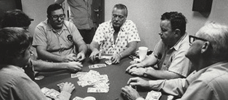Reviews
Frederick Wiseman
USA, 1986
Credits
Review by Leo Goldsmith
Posted on 16 June 2008
Source Zipporah Films DVD
Categories Frederick Wiseman
Frederick Wiseman’s films invariably commence with a prologue of establishing shots, a montage that serves to situate the viewer in the particular context of his chosen subject, evoking the quiet hum of the place the film’s actors navigate. In Adjustment & Work, one of a series of films about the Alabama Institute for Deaf and Blind, this prologue is especially pronounced. It may be longer than most other analogous sequences in his films, but perhaps it only seems as much because of the film’s subject matter. Wiseman enumerates the sights and sounds of Talladega, Alabama - the railroad tracks, quiet streets and homes, a few shops downtown - almost as if to list those things most of us might take for granted: the quotidian pleasures of the small town where resides the E.H. Gentry Technical Facility at the aforementioned Alabama school, brought to us in a way that the facility’s students are not likely to experience. It would seem to most of us a pleasant, quiet community, neither forbiddingly wealthy nor disproportionately poor, but to the subjects of the film tomorrow, it presumably can be a treacherous landscape—indeed, one certainly not to designed to accommodate the sense-impaired.
Of the four films in this series, Adjustment & Work is the only one that focuses entirely on adults—specifically adults who have recently lost their sight (and hence are adjusting to this change) and those without sight or hearing who are learning skills in order to enter the workforce. Thus, we first meet a man who is attempting to learn the layout of a room. A table and chairs sits in the center of the room, and an instructor coaches the man to remove certain items from the table’s surface and then to use various landmarks in the room to find his way back again. The sequence takes some six minutes, and Wiseman allows the man’s actions to play out in a series of very long, patient takes, drawing us into this tiny suspense drama that emphasizes the man’s deep concentration in a task that most of us would execute without thinking. Occasionally, with the merest hint of frustration, the man pauses to scratch his eye, then probes ahead.
Most of the first half of the film is concerned with the instruction of people with various handicaps in tasks like these: ones which we might be inclined to regard as simple, but for the sense-impaired require an “adjustment” of some kind. There is the aforementioned man “learning a room,” and there are several students undergoing tests of their motor skills, eye-hand-foot coordination, and their sensitivity of touch. Others, like a young blind woman named Donna, seem to be alarmingly ill-equipped to handle certain basic tasks. After we watch her receive instruction in the maintenance of household items, another instructor shows her - at some length - how money is counted. We then learn that Donna recently lost some money, having either miscounted it or had it swindled from her in some unscrupulous manner, and so the scene takes on a tone of urgency rather than pity. It is not that this woman is incapable, but rather that there are those that may help her to partially overcome her impairment and those that will exploit it.
And yet, at all times we are aware of the great distance between these two sets of adults: teachers and students. Occasionally, perhaps understandably, there is a tendency among the instructors to infantilize their students, though this seems to depend on the personality on the student in question. (Donna’s instructor commends her as “good girl,” but he is relatively neutral with her classmate, Brenda, who has only been blind for a year. Brenda seems a good deal more determined and upbeat than Donna, declaring, in what could be the movie’s epigram, “I’m adjustin’, thank God.”) But in spite of the fact that all onscreen are adults and ostensibly equal, there is always a lingering sense of distance between them, and between the presumably able-bodied viewer (or filmmaker) and the impaired subject. One experiences this distance even in the simplistically voyeuristic act of seeing the sightless - watching a man who cannot see you - but Wiseman also denotes small pockets of a deaf community that remains closed to us. In a recreation room, a few people plays pool and Atari and watch TV. They sign to each other, sometimes with great emotion as if in an argument, but Wiseman leaves all of these conversations untranslated. This world is as inaccessible to most of us as ours can be to them.
But Adjustment & Work is a film about the attempt to bridge these worlds, even if this task seems occasionally overwhelming. Wiseman’s film emphasizes nothing so much as the decency and patience of the instructors and the optimism, fortitude, and even eagerness of the students to learn, but as in some of his films about more problematic institutions (like Law & Order and Welfare) what most comes across is the valiant effort people put into social endeavors, however impossible they may seem.
Once the film shifts its focus to the instruction of the deaf and blind in work skills (mainly factory work, making military uniforms or constructing mops and brooms), we are given a greater sense of the problems of negotiating the distance between impaired and able-bodied in a professional environment. The film’s culminating scene is a management meeting at a government-subsidized factory that employs blind people. One sighted manager raises the issue of certain “problem” students who claim sickness to avoid work. He suggests - but doesn’t quite fully iterate - that, as a sighted person, he has no cause to challenge a blind person who might likely be a “sick person.” But his colleague, a blind staff member, disputes this label—those who are merely “layin’ out” or guilty of absenteeism should handled accordingly, but that doesn’t mean blind people should be characterized (or, indeed, pitied) as being “sick.” This argument remains unresolved at the film’s end—the sighted manager still feels squeamish about doubting the word of his blind employee. This discussion once again drives home the inherent difficulties of incorporating impaired people into a society that seems incompatible, even as it champions the diligence and rectitude of those endeavoring to make it less so.
More Frederick Wiseman
-

Titicut Follies
1967 -

High School
1968 -

Law & Order
1969 -

Basic Training
1971 -

Juvenile Court
1972 -

Primate
1974 -

Welfare
1975 -

Meat
1976 -

Sinai Field Mission
1978 -

Manoeuvre
1979 -

Model
1980 -

The Store
1983 -

Blind
USA -

Adjustment & Work
1986 -

Missile
1987 -

Central Park
1989 -

Near Death
1989 -

Aspen
1991 -

Zoo
1993 -

High School II
1994 -

Ballet
1995 -

La Comédie-Française
1996 -

Public Housing
1997 -

Belfast, Maine
1999 -

Domestic Violence / Domestic Violence 2
2001 / 2002 -

The Last Letter
2002 -

State Legislature
2006
We don’t do comments anymore, but you may contact us here or find us on Twitter or Facebook.



